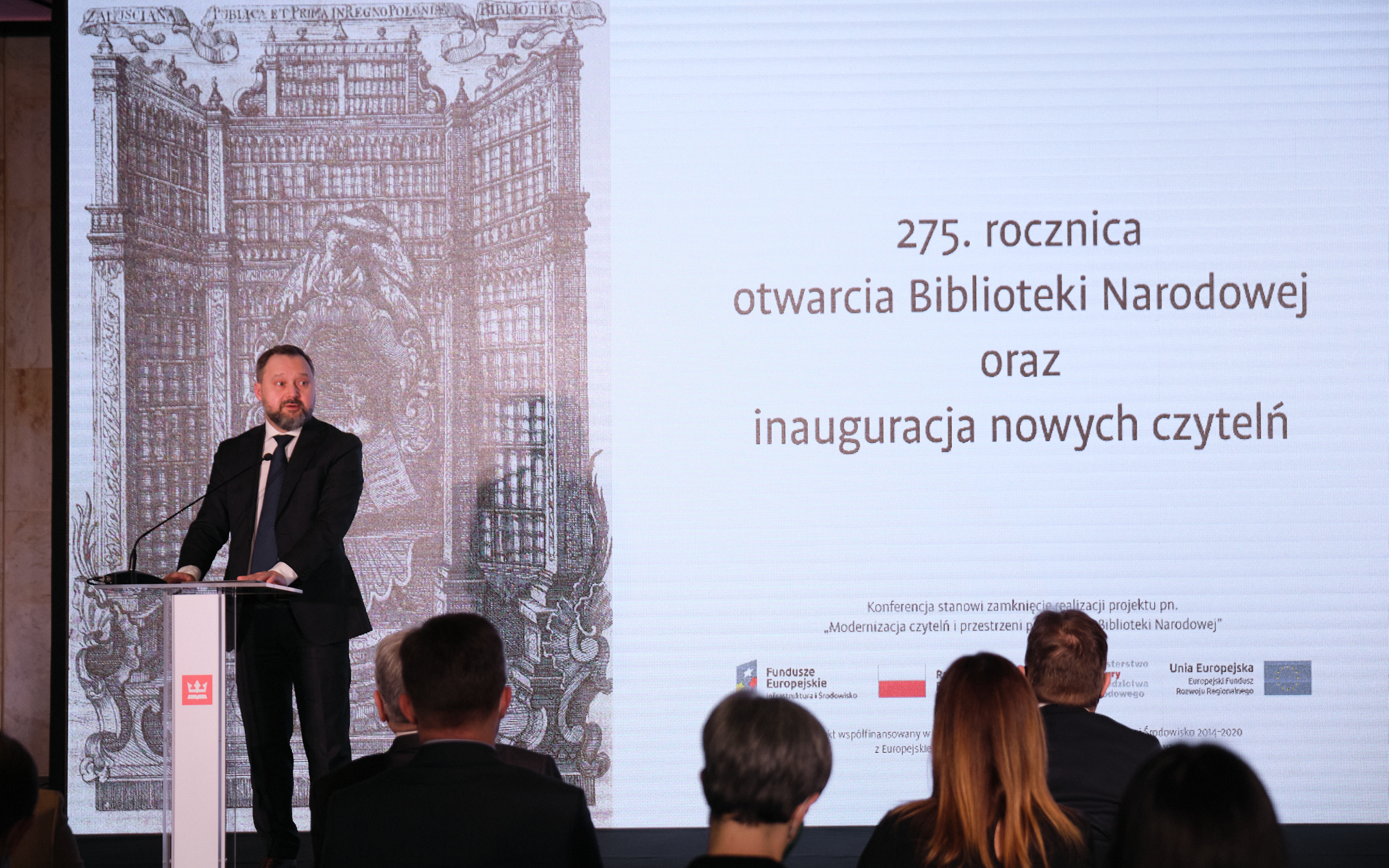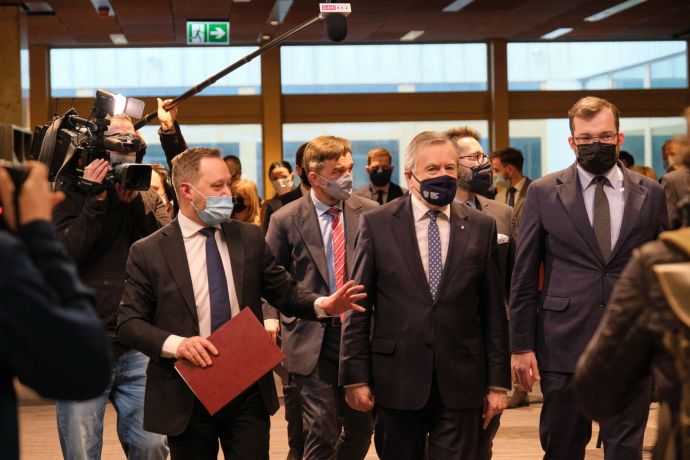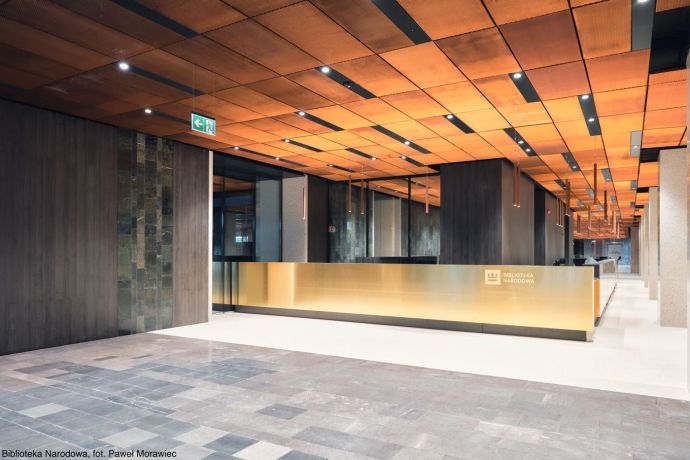275th anniversary of the opening of the National Library of Poland and inauguration of the new reading rooms

On Thursday, January 20, 2022 a ceremony was held to mark the 275th anniversary of the opening of the National Library of Poland and the inauguration of the new reading rooms. The event was attended by representatives of the Polish government, directors of various libraries, cultural, academic and scientific institutions, plus employees of the National Library itself. The ceremony marked the completion of the "Modernisation of the reading rooms and public spaces of the National Library" project.
Guests at the event included Deputy Prime Minister and Minister of Culture and National Heritage Professor Piotr Gliński, Minister of Funds and Regional Policy Grzegorz Puda and Deputy Speaker of the Polish Senate Bogdan Borusewicz. Written congratulations were sent by the President of the Republic of Poland Andrzej Duda, the Speaker of the Polish Sejm Elżbieta Witek, Prime Minister Mateusz Morawiecki and Minister of Education and Science Professor Przemysław Czarnek.
Following the modernisation, the reading rooms are now three times their previous size. The new, functional spaces provide readers with access to around ten million volumes from the National Library's storerooms and 3.5 million digital objects via the polona.pl website. The reading rooms also offer free reader access to four times as many books as before. Smaller, specialist reading rooms for research teams have also been created.
In his letter of congratulations, President of the Republic of Poland Andrzej Duda wrote as follows: "The National Library plays an important role in nurturing Polish heritage and identity and disseminating learning. It spreads knowledge about literature, conducts and supports research and facilitates the acquisition of information and education for hundreds of thousands of people each year. Increasingly, it does this by digitising its holdings and making them available online [...]. Today I would particularly like to thank you for the great achievement represented by the polona.pl digital library".
Deputy Prime Minister and Minister of Culture and National Heritage Professor Piotr Gliński spoke as follows: "The National Library has been destroyed and plundered in the past, but it has always been able to rise again. It is a symbol of the durability of Polish culture, its vitality and the hard work involved in caring for it. These new reading rooms, new architectural solutions, will contribute to the further development of Polish culture and reading".
Dr Tomasz Makowski, Director of the National Library, invited the guests to visit the new space. "National libraries around the world are symbols of independence," he said. "The Polish National Library is a special symbol: it was closed and destroyed twice when Poland lost its independence, and it was reopened each time when Poland regained its independence. The collection had to be repeatedly built up, almost from scratch. Today the basic task of the National Library remains unchanged: we collect Polish writing in its entirety. The National Library serves as the living memory of the Republic of Poland".
The interiors of the new National Library reading rooms use high-quality materials: copper on the ceilings, steel, wood and stone. These visually enhance the rooms while allowing them to retain their modernist character. The space has been designed with no architectural barriers so all readers can access it freely, whether they have a disability or not. The rooms are complemented by four internal gardens, each with a different design and specially selected plants that change with the seasons, plus a garden of fruit trees.
Dr Tomasz Konior, architect of the new reading rooms, stated as follows: "A library is a meeting place – a unique world of people and books, a temple of high culture, a place for the acquisition of knowledge and the shaping of consciousness".
After the official part of the ceremony, the guests visited the new reading rooms. In the Newspapers & Current Periodicals Reading Room, by the entrance, readers can browse the latest issues of newspapers and journals, use the Internet and access the digital holdings of the National Library. This area is open to everyone: no reader's card is required. The Lower Reading Room, located under the skylight and accessed via a spiral staircase with a lift inside, can be used by readers who want to enjoy natural daylight. The Recent Publications Reading Room offers the latest publications, updated daily. Next to it, old encyclopaedias and dictionaries can be consulted in the Reference Book Reading Room. The largest of the reading rooms is the Upper Reading Room, which features a comprehensive collection of history and fiction, also on open access shelves. The Upper Reading Room leads directly to the Załuski Reading Room, named after the Library's founders, which houses the largest collection of bibliological works in Poland. Manuscripts, early printed books, rare items and old catalogues from libraries all over the world are available in the only closed reading room, the Rare Book and Manuscript Reading Room. Users continue to enjoy access to the Maps Reading Room, the Music Reading Room and the Sound and Video Recordings Room.
OPENING OF THE NEW READING ROOMS TO USERS
After the official completion of the modernisation project on January 20, the transfer of thousands of books to the shelves in the new reading rooms will begin. The Library will open to readers on February 24, 2022, the anniversary of the Library's "reactivation" by the Polish President Ignacy Moscicki in 1928.
275TH anniversary of the opening of the national library of poland
The official opening of the new public spaces coincided with the 275th anniversary of the opening of the National Library. In honour of the founders of Poland's first national library, Andrzej and Józef Załuski, the reading room containing the bibliological collection is named the Załuski Reading Room.
The initiative to create a national library was first announced in the Programma literarium of 1732. The Library was one of the first national libraries in Europe and the first in Poland. It opened its doors to readers in Warsaw in 1747 as one of the largest publicly accessible libraries in Europe at the time. After the death of its founders it passed into the care of the state, as the Library of the Republic (Biblioteka Rzeczypospolitej). In 1780 the Polish Parliament (Sejm) granted it the right to receive a legal deposit of every publication from Polish territory.
The National Library was twice liquidated and to a large extent destroyed. After the loss of Polish independence in 1795 it was transferred by order of the Tsarina Catherine II to St Petersburg, where it formed the basis of the Tsarist library. Partly returned following the Treaty of Riga in 1921, it represented the most valuable collection of the reactivated National Library in the Second Polish Republic, until it was set fire to by the Germans following the Warsaw Uprising in 1944.
A SHORT HISTORY OF THE NATIONAL LIBRARY BUILDING
The main building of the National Library at 213 Niepodległości Avenue was designed in the 1960s by the architect Stanisław Fijałkowski. The foundations of the complex of buildings (including the reading rooms, administration rooms and a storeroom) were laid in April 1976. In 1995 the Main Reading Room was inaugurated. Later building work included thermal modernisation and measures to ensure the energy efficiency of the building, the addition of Internet infrastructure, functional and aesthetic changes and the creation of green areas.

This project is co-financed under the Infrastructure and Environment Operational Programme 2014–2020 from the European Regional Development Fund and the Polish state budget.

